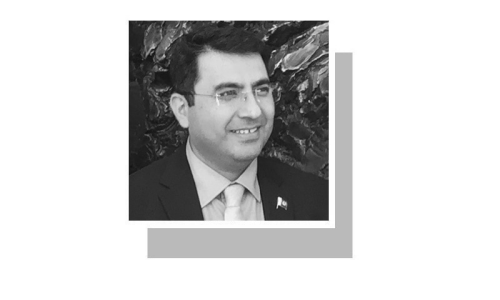
For once, the national team played to its potential, and it is kind of funny how everybody seems to have a problem with that. Apparently, we all wanted a fluke here, a chance there and broad strokes of luck everywhere to play the Asia Cup final; and then another cycle of a fluke here, a chance there and broad strokes of luck everywhere to even lift the trophy. Practically, we should have been blaming the fickle nature of fluke, chance and luck that betrayed us through the tournament. But for some strange reason, we are blaming the players, the captain, the coach, the trainers, the selectors and even those up the pecking order. Why? Oh Why? Have we gone nuts?
Perhaps our grumbles are indicative of some psychological denial about the true potential of the national side. If it is a Pakistani outfit — or anything Pakistani, for that matter — it can only be good. No, no, no … not good; great, actually. Or maybe ‘awesome’ sounds still better. And, come to think of it, Mickey Arthur must be given due credit for having adapted to this Pakistani mindset so well that he more than deserves to be granted honorary citizenship just for that. After having spent a good 30 months selling the mantra of physical fitness being his primary goal, he now says the team is struggling on the psychological front. We were told that the results would have to wait in the interest of long-term future. And we are being told that he is now facing a new kind of problem in the medium term, which means the wait would have to continue for positive results.
What he is saying practically is that there is nothing wrong with the team in cricketing terms. If the boys can be made physically and mentally stronger, the rest will take care of itself. Really? We lost to India that didn’t have Virat Kohli and Hardik Pandya. Twice. Embarrassingly. We lost to Bangladesh that didn’t have Tamim Iqbal and Shakibul Hasan long before the match was over. When it was finally over, it was the agony, not the match, that was over. And we could beat by the skin of our teeth a team like Afghanistan that has played 109 ODIs in nine years against Pakistan’s 899 matches in the last 46 years.
We have allowed the legacy of the 1992 World Cup triumph to stand in our own path, to cover up our lack of professional consistency
All this is psychological? Really? This is high-degree denial reflective of serious disconnect from reality. This is more psychiatric than psychological. But, in the spirit of giving the devil its due, Mickey certainly has reasons to play that line; his job, his dollars and the dollars of two more whom he has hired to assist him in prolonging his stint. What reason do we, the Pakistanis, have … if any?
Let’s go hypothetical. A win against Bangladesh — something that was more than expected — would have given us a chance to redeem ourselves in the final. A half-strength India on an off-day would have given us the trophy. Would we still be talking of the ‘need’ to change the captain, to streamline the selection process, to kick Mickey and his clique where it hurts? We would have been pumping our imaginary biceps, triceps and tendons. The folklore of ‘cornered tigers’ would have been churned out endlessly, and all the trash would have been swept under the rug.
It is not as hypothetical as many would like to believe. We have done it before. Repeatedly. Excitedly. And, if one may say so, irritatingly. You see, the problem with the ‘cornered tiger’ narrative is seriously hampering any effort to put our act together. We are so heavily invested in the narrative that we struggle to see the basic logic; it is good — very, very good, actually — only and only when it comes off. And that doesn’t happen often. A cornered tiger generally ends up in some zoo or circus. Sometimes it gets skinned and adorns the wall, posthumously, of some lavish living room as a hunting trophy. And these are not the places where a tiger wants to be. Or anyone wants to be.
Our fascination with the narrative leaves little ground for us to do something about not getting cornered — at least not as frequently as we let it happen. It is rather bizarre how we have allowed the legacy of our World Cup triumph in 1992 stand in our own path. Rather than looking back at it and enjoy what was truly glorious, we have converted it into a façade to cover up our lack of professional consistency.
With the T20 Pakistan Super League (PSL) now acting as our template for planning and future selection, it is only obvious that we believe in one-night wonders to do it over a lifetime when the players are not good enough to do it over 50 overs. The team is not good enough and it has not been good enough for a long time. And it is not good enough in purely cricketing, not psychological, terms.
In these days of austerity and belt-tightening, it might make sense for someone somewhere to think about the need to stop nurturing this inconsistency and incompetence with central contracts. After all, we do it because other countries do it. Earlier, people had to earn their colours time and time again. Today, they have to do that only at appropriate times.
And, continuing in that vein, do we really have to dish out the dollars to Mickey and his friends? Maybe we can use some of them, if not all, to build a dam. Just saying.
Maybe we can convert the Asia Cup negative into a positive by taking a deeper, harder, smarter look at the overall picture. If we can flip the 1992 equation to our disadvantage, we can surely do the same this time to our advantage rather than getting swayed into a state of euphoria with whatever happens in the series against a seriously curtailed and demoralised Australian side in the UAE.
Published in Dawn, EOS, October 7th, 2018















































Dear visitor, the comments section is undergoing an overhaul and will return soon.